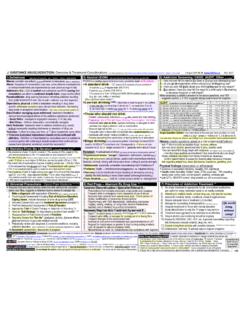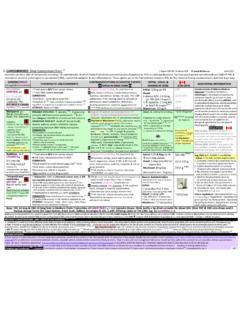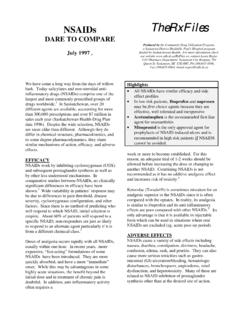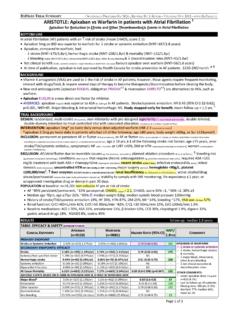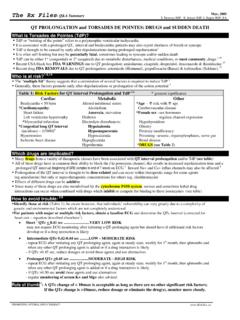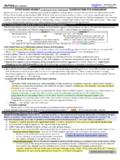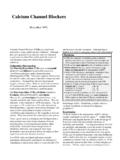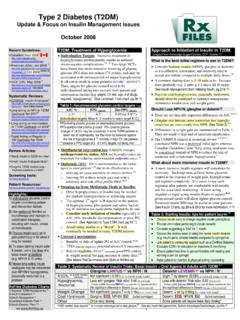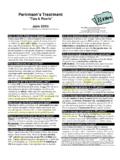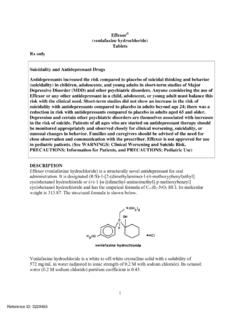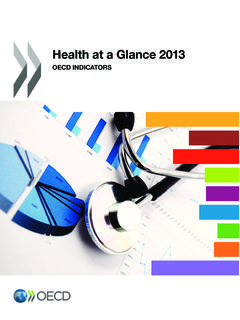Transcription of RxFiles www.RxFiles.ca April Q&A Summary BSP, MSc
1 RxFiles Q&A Summary April 2012 Lynette Kosar BSP, MSc Are Antidepressants Safe during Pregnancy & Breastfeeding? Up to ~25% of pregnant women will suffer from depression while The decision on how to treat depression and/or anxiety during & after pregnancy requires careful consideration of benefits and harms & collaborative discussions with the patient. SHOULD ANTIDEPRESSANTS BE DISCONTINUED BEFORE OR DURING PREGNANCY? 1,2 It depends on the patient's previous and current mental health status. Patients may be a candidate for tapering and discontinuing their antidepressant if they have had mild or no symptoms for 6 months. Taper the dose by 25% every 1 2 weeks. Work with patient & family to monitor closely for signs of relapse & withdrawal symptoms. Patients should not discontinue their antidepressant if they have a history of severe recurrent depression, psychosis, bipolar illness, serious suicide attempt, psychiatric comorbidities requiring drug therapy and/or anxiety even if asymptomatic.
2 In such patients, the harm of not taking an antidepressant may exceed the harm of taking drug therapy. The rate of relapse is high during pregnancy. Based on a prospective cohort study, females who suffered from recurrent major depression & discontinued their antidepressant during pregnancy were 5 times more likely to relapse compared to those who maintained their Of those who relapsed, ~50% did so during the 1st trimester, with ~90% by the end of the 2nd trimester. IS THERE ANY HARM IN NOT TREATING DEPRESSION AND/OR ANXIETY DURING PREGNANCY & POSTPARTUM? 1,3,4,5,6,7,8,9,10,11 Untreated depression and/or anxiety can put the mother & fetus/baby at risk, with suicide & infanticide being the major concern. Depressed mothers are more likely to miss prenatal appointments, be malnourished and engage in harmful behaviours ( smoke, drink alcohol and/or use other substances), and are less likely to take prenatal vitamins.
3 There is a higher risk of spontaneous abortions, miscarriages, gestational hypertension, preeclampsia, preterm deliveries, low birth weight, small for gestational age, cesarean section, low Apgar scores, need for neonatal intensive care & length of hospital stay. Some antidepressant studies have found these same risks, but most were unable to control for underlying Postpartum depression can impact the mother's ability to care for and bond with her child. Infants are at a higher risk of irritability, inactivity, inattentiveness, and fewer facial expressions. They often have a similar physiological profile as depressed mothers, such as cortisol, and peripheral levels of dopamine, serotonin & norepinephrine. Cognitive, emotional and behavioural concerns can surface when an infant is exposed to a chronically depressed mother. WHAT IS THE ROLE FOR NON PHARMACOLOGICAL THERAPIES DURING PREGNANCY & POSTPARTUM PERIOD?
4 1,4, 6,7 Depression and/or anxiety focused psychotherapy ( interpersonal psychotherapy or cognitive behavioural therapy [CBT]) may be considered first line therapy in mild to moderate depression/anxiety. It may also be combined with antidepressants in moderate to severe depression/anxiety in an effort to the medication dose. On line CBT Saskatchewan residents: (see on line Extras). Electroconvulsive therapy (ECT) is considered safe & effective for depression during pregnancy. It is an option for moderate to severe depression in pregnant patients who are unsuitable for or unresponsive to antidepressants, have psychotic features, &/or are suicidal. Exercise & relaxation techniques are recommended for mild depression/anxiety or as an adjuvant for moderate to severe symptoms. WHEN SHOULD ANTIDEPRESSANTS BE CONSIDERED? 1,3,4 Antidepressants can be used for moderate to severe depression and/or anxiety, psychotherapy.
5 Although antidepressants are not 1st line in mild depression/anxiety, medication may be tried if psychotherapy is not available or has previously failed, or with a history of severe depression/anxiety or good response to previous antidepressants. WHICH ANTIDEPRESSANTS ARE CONSIDERED THE SAFEST DURING PREGNANCY? 1,3,4,6,12,1314 Antidepressants do not appear to significantly the risk of congenital malformations more than the general population risk of 2 4%. Overall, selective serotonin reuptake inhibitors (SSRIs) have the most data for reasonable safety during pregnancy. See below for specific concerns with paroxetine; all other SSRIs ( sertraline, citalopram) appear to have a similar safety profile. Tricyclic antidepressants (TCAs) do not appear to be teratogenic & serum levels can be monitored; however, anticholinergic side effects & risk of overdose need to be , amitriptyline & nortriptyline are the preferred TCAs during pregnancy.
6 Newer antidepressants (bupropion, duloxetine, venlafaxine, mirtazapine): these agents do not appear to be teratogenic, but there is limited data available. Bupropion is considered to carry low risk in humans, & may be useful if encouraging smoking cessation. DOES PAROXETINE CAUSE CONGENITAL MALFORMATIONS WHEN USED IN THE FIRST TRIMESTER? 1,2,4,6,8,15 Accumulated evidence would suggest there is not an increased risk, although some data is conflicting and there are study limitations. Case control, cohort, and meta analysis of these studies, have not been consistent with their findings. In the studies that found an increased risk of malformations (congenital and/or cardiac) with paroxetine use, the risk was 2 fold or less. One study suggested the risk of congenital & cardiac malformations is dose dependent, with doses >25mg/day. If starting an antidepressant in a woman of childbearing potential or who is pregnant consider selecting an antidepressant other than paroxetine, unless the patient has responded to paroxetine in the past &/or has failed other agents.
7 If a pregnant woman is stabilized on paroxetine you may continue paroxetine, especially if the patient has previously failed other antidepressants. Decreasing the dose may help reduce potential risks. Switching to another antidepressant in the first trimester is an option, but switching medications may result in relapse. RxFiles Q&A Summary April 2012 Lynette Kosar BSP, MSc DO SSRIS CAUSE PERSISTENT PULMONARY HYPERTENSION OF THE NEWBORN? 1,3,8,16,17,18 The available data is conflicting and has several limitations. If a true association exists, the risk is very small. Persistent pulmonary hypertension of the newborn (PPHN) is a rare but serious complication. There are several causes, including meconium aspiration 40% of cases, smoking, obesity, cesarean section, and preterm delivery, to name a few. Depression itself has been linked to increased risk of cesarean section and preterm delivery.
8 It has been questioned if PPHN and antidepressant neonatal behavioural syndrome are linked, but this has yet to be confirmed. PPHN has not been linked to non SSRI antidepressants. Six published studies have investigated the potential link between SSRI use during pregnancy and PPHN. Three studies found no association and the remaining three found a to 6 fold increase in risk. Limitations of the evidence: studies to date have been case control or cohort; two of the trials that found an increased risk used the same database, although the more recent study included additional patients; the severity of PPHN and clinical course were not defined, diagnostic criteria varied and not all confounders were accounted for. If there is a to 6 fold increase of PPHN in infants exposed to SSRIs, the absolute risk increases the baseline risk of 1 2 per 1000 ( ) to 12 per 1000 ( ). There have been no published reports of SSRI induced PPHN resulting in death.
9 DO ANTIDEPRESSANTS CAUSE NEONATAL BEHAVIOURAL SYNDROME? 1,3,4,7,8,10,19 neonatal adaptation syndrome Neonatal behavioural syndrome has been reported in up to 30% of infants exposed to antidepressants near term however it is felt to be clinically observed in of the cases. All antidepressants carry this risk; however, it is usually mild and transient. Signs and symptoms include tachypnea, cyanosis, jitteriness, tremors, increased muscle tone, feeding disturbances, irritability, temperature instability, hypoglycemia, and, rarely, seizures. Usually presents within hours of birth, is mild and often resolves within two weeks. It is not know if it results from neonatal withdrawal or toxicity. In utero nicotine exposure can cause similar symptoms. Babies exposed to SSRIs near term should be monitored in hospital for at least 48 hours after delivery. Families should be counseled to observe for the above signs & symptoms.
10 WHICH ANTIDEPRESSANTS ARE CONSIDERED SAFE DURING BREASTFEEDING? 3,6,9,20,21 SSRIs have the most safety data during lactation, and are considered to have a better safety profile than TCAs. However, the safety of long term antidepressant exposure in the infant via breast milk is unknown. All SSRIs are excreted into breast milk to varying degrees: Sertraline, paroxetine and fluvoxamine have the lowest degree of excretion into breast milk. Citalopram, escitalopram and fluoxetine have longer t , higher infant doses & greater number of reported infant adverse events. The Canadian Pediatric Society recommends that postpartum use of any SSRIs is not a contraindication to breastfeeding. Educate mothers to monitor for & report sedation, nausea, reduced suckling or any other sign of drug toxicity in the infant. TCAs: amitriptyline, clomipramine, desipramine, imipramine & nortriptyline are likely safe during breastfeeding.
